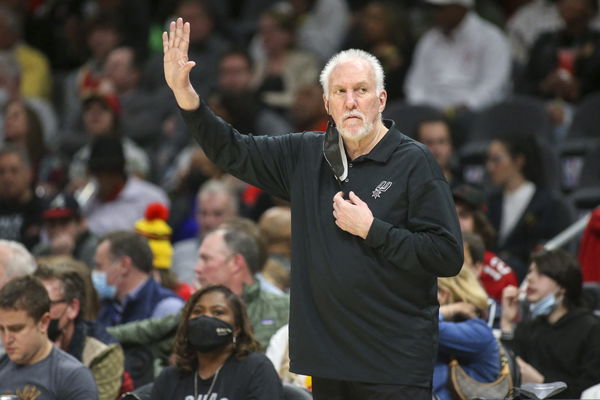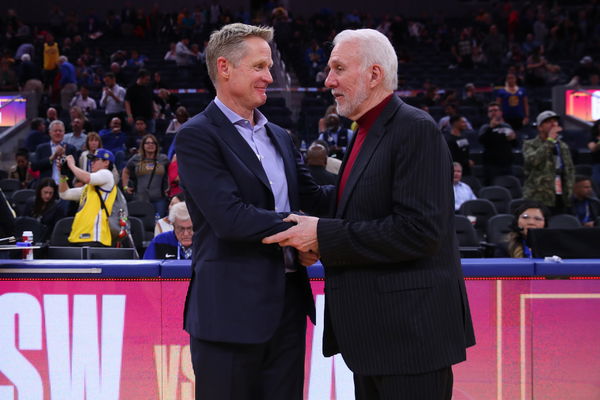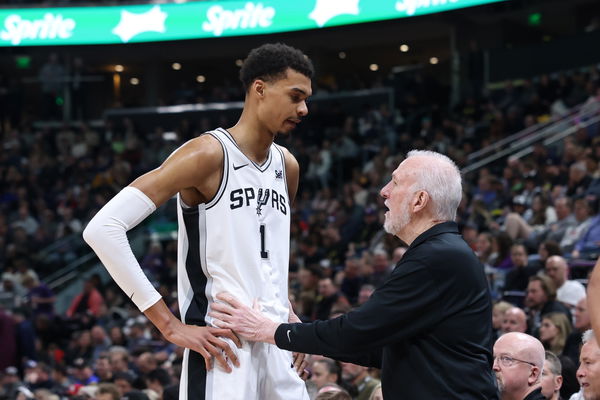
USA Today via Reuters
Feb 11, 2022; Atlanta, Georgia, USA; San Antonio Spurs head coach Gregg Popovich calls a play against the Atlanta Hawks in the second half at State Farm Arena. Mandatory Credit: Brett Davis-USA TODAY Sports

USA Today via Reuters
Feb 11, 2022; Atlanta, Georgia, USA; San Antonio Spurs head coach Gregg Popovich calls a play against the Atlanta Hawks in the second half at State Farm Arena. Mandatory Credit: Brett Davis-USA TODAY Sports
When legendary coaches in the NBA are discussed, Gregg Popovich is not only included, but rather, he is the discussion. Five NBA championships, several playoff appearances, and a reputation for making players better people. But maybe the most underappreciated aspect of Popovich’s greatness? The coaching tree he’s built quietly over the years. It’s a tree that goes far and wide, with branches now planted in several NBA franchises and even the WNBA.
Watch What’s Trending Now!
Popovich didn’t simply coach games — he coached coaches. His sideline was a masterclass, a prep school for the next generation of league leaders. And now, as increasing numbers of his former assistants become successful head coaches, it’s becoming obvious that Pop’s influence may be the most dominant in contemporary basketball. With Gregg Popovich now stepping away from coaching, there is no better occasion to look back at the wonders of this OG coach.
Who are the most successful NBA head coaches to come from Gregg Popovich’s coaching tree?
Gregg Popovich’s coaching legacy isn’t just limited to those who sat beside him on the bench. It extends to those who learned from him on the court, too. One of the most notable examples? Steve Kerr. While Kerr never served as an assistant coach under Gregg Popovich, his years as a player with the San Antonio Spurs left an indelible mark on his coaching philosophy. So we’d be seriously off if we didn’t mention Steve Kerr.
Reflecting on Popovich’s retirement, Kerr expressed profound gratitude: “I just want to say thank you to Pop and to the Spurs organization for everything that they meant to me and my career,” he said. “The number of people Pop has influenced…is just incredible. Pop is one of the most important people in my life.” Before a game against Ime Udoka’s Rockets, Kerr even sported a T-shirt with Popovich’s face on it. A gesture of pure love and respect. “Pop’s going to kill me for wearing this shirt,” Kerr joked. “He’d call me a hapless rube.” The moment was more than just a fashion choice. It was a nod to the coaching legend and a reminder of how Pop’s retirement managed to bring two of his former players, now coaches, together in mutual respect even as their teams battled for playoff positioning.
Kerr’s approach with the Golden State Warriors, emphasizing team culture, player relationships, and creating an environment where players feel valued, mirrors the principles he observed under Popovich’s leadership. With four NBA championships as head coach of the Warriors, Kerr exemplifies how Popovich’s mentorship extends beyond formal coaching roles, influencing those who played under him to carry forward his legacy.

But you don’t just spend two decades under Popovich unless you’re learning something truly special. Just ask Mike Budenholzer. After winning four rings with the Spurs as an assistant, he stepped into the spotlight with the Milwaukee Bucks and delivered a title in 2021. Oh, and he’s got two Coach of the Year awards too. Not bad for a guy who once carried Pop’s clipboard.
And then there’s Mike Brown, who served under Pop from 2000 to 2003 and won a championship along the way before coaching LeBron’s Cavaliers and now the Sacramento Kings. He’s not only winning games, he’s reviving franchises and piling up Coach of the Year trophies (2009, 2023) while he’s at it. But the 2024–25 season didn’t go his way. After a rocky start, Brown was let go midseason. Still, his impact on both franchises and his decorated coaching résumé are undeniable proof of the Popovich imprint.
Ime Udoka grabbed the Pop playbook and went head-turning right away in Boston, leading the Celtics to the Finals in his first year. Now, he’s it again in Houston, where he’s gradually getting the Rockets back into the playoff picture.
And let’s not forget about Becky Hammon. Although she hasn’t been the head of an NBA team (yet), her stint as the league’s first full-time female assistant coach under Popovich opened doors, and she pushed through them. Two WNBA championships as head coach of the Las Vegas Aces show she’s doing more than just making history. She’s making a difference.
How did Gregg Popovich influence the careers of his assistant coaches?
Pop wasn’t the type of coach who yelled orders and demanded silence. He constructed his staff as a team of peers. Coaches who would someday run the show themselves. His style was based more on mentorship than micromanaging. He left his assistants to make actual, proper decisions, call practices, and even have their say during games. Essentially, you weren’t just taking notes; you were getting reps.
He also played the long game. Popovich understood that true growth comes slowly. He gave his assistants space to make mistakes while figuring things out and develop without the fear of being benched or replaced. That level of trust created confidence, and that’s why so many of his former assistants are now successful head coaches.
And let’s be real, his track record really does show that Pop had influence. When he endorsed someone, teams took notice. He wasn’t afraid to push his own players out if the nest, even if it hurt his own bench. That level of selflessness? It speaks volumes about his leadership.
But most enduringly of all? The manner in which he led with integrity, with culture, and above all, with connection. His coaches did not merely learn how to call plays. They learned how to call teams. teams that players will want to fight for, just because the atmosphere feels right.
Which current NBA coaches were former assistants under Gregg Popovich?
The most interesting thing is that Pop’s coaching legacy isn’t just in the past. It’s alive and well in the modern-day NBA as well.
Will Hardy, now with the Utah Jazz, absorbed six years’ worth of smart advice on the Spurs’ bench. He joined the jazz staff in 2022 and quickly established himself as one of the league’s bright young coaching talents. smart, steady, with no hesitation about taking big gambles. Sure does ring a bell, right?
Ime Udoka is still doing his thing in Houston, and if the Rockets keep trending up, we’re probably going to be talking about him deep into the playoffs.
And then there’s Mitch Johnson, who just replaced Pop himself in San Antonio. That’s no easy feat. But Johnson, who’d been an assistant coach since 2019, is familiar with the system left and right. It’s a homegrown change, and it holds the Spurs’ identity intact.
Even James Borrego, who is now an assistant with the Pelicans, had a serious stint as the head coach of the Hornets. Although he’s not in charge at the moment, he’s still bringing that Spurs sheen wherever he goes.
How has Gregg Popovich’s coaching tree shaped modern NBA coaching?
What began in San Antonio has become a global basketball philosophy. Popovich’s former players and assistants now lead as NBA coaches, front office executives, G League mentors, and international influencers. His model for building smart, durable teams is spreading fast.
More importantly, his coaching tree has reshaped the NBA. The era of drill sergeants is fading. Pop’s proteges prioritize chemistry, empathy, and emotional intelligence—because relationships win games just as much as strategy does.

Popovich also changed the face of NBA coaching—literally. By hiring Becky Hammon and championing diversity, he pushed the league toward more inclusive, thoughtful leadership, which is now becoming the norm.
On the court, his influence is everywhere. From ball movement to situational play, his style has become the standard. His coaching tree isn’t just shaping games—it’s redefining how basketball is coached.
Pop won’t coach forever (even if Spurs fans wish he would), but his legacy will. Former assistants and players like Steve Kerr now lead teams and build cultures the Pop way. It’s more than a system—it’s a mindset. One that values people as much as performance, and sees coaching as a responsibility, not just a job.
You can see it in the sharp rotations, the selfless huddles, the trust in every bench. That’s the coaching tree at work. And that’s Popovich—still shaping the game, even without the clipboard.

